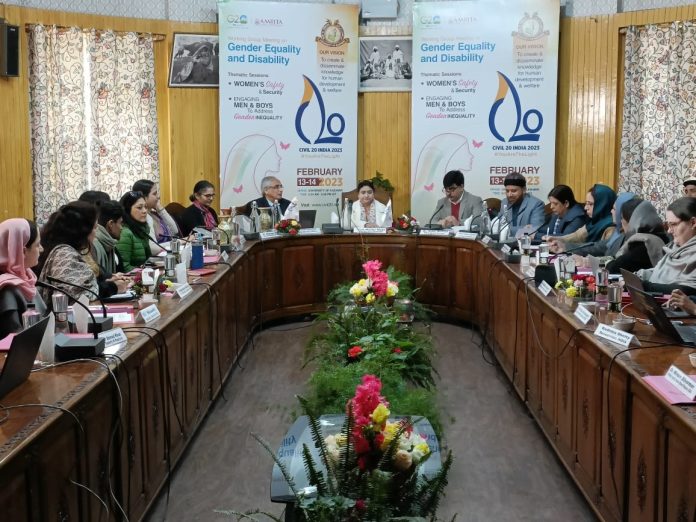Universities powerful institutions to drive positive social change: VC; India strong advocate of women’s empowerment: Ex-UN USG India Vijay Nambiar
SRINAGAR: A two-day C-20 Working Group Meeting on ‘Gender Equality and Disability’ being held under the aegis of India’s G20 Presidency started at the University of Kashmir on Monday.
Vice-Chancellor KU Prof Nilofer Khan presided over the opening session of the significant event that brings a diverse set of stakeholders, including national and international coordinators of C20 Working Group on GED, on a common platform to formulate actionable policies on gender equality for consideration by the G20 leaders during their summit in September this year.
In her presidential address, Prof Nilofer said hosting such important events is a testimony to relentless efforts put in by the University to make a strong imprint on the country’s academic landscape.
“It has been rightly conceived by the country’s leadership to engage universities to help attain 17 Sustainable Development Goals (SDGs) identified by G20 Countries, because universities are powerful institutions having a great capacity to drive a positive social change,” she said, adding that apart from promoting research on emerging challenges that impede the cause of gender equality, the universities can utilise the student community as a strong means to engage with the community to promote awareness on gender equality.
The Vice-Chancellor thanked the Chair of C-20, Her Holiness Mata Amritanandamayi Devi, the Chancellor of Amrita University, for choosing University of Kashmir as venue for the event.
In his welcome address, Vijay Nambiar, C20 Sherpa and Former UN USG, India, said the Working Group on Gender Equality and Disability is mandated to probe deeply into needs and fresh challenges of the most vulnerable and ensure they are heard and acknowledged.
“India has strongly advocated women’s empowerment across all spheres. Our Constitution contains major provisions and courts have pronounced landmark decisions that have greatly transformed the gender landscape within the country,” Nambiar said, calling for “integrating these decisions into the inner landscape of our communities especially in rural countryside as well as in Tier 2 and Tier 2 Cities.”
“Without men reimagining their role in this entire process, it will become difficult for the system to change,” he said, complimenting the University of Kashmir for hosting the event.
Dr Bhavani Rao, India Co-Coordinator C20 GED Working Group, said the programme aims to ensure that civil society considerations related to gender and disability are taken into account in the G20 discussions and translated into the G20 Leaders’ Declaration as policies and commitments to be implemented. She also gave an outline of the two-day event, which includes panel discussions on Legal Reform, Public Platform and School Curricula, besides gender sensitisation and youth mentorship. The event also showcases ‘Udhaaran’ as an initiative to promote gender equality, and broad discussions on two sub-themes viz. Women’s Safety and Security and Engaging Men and Boys to Address Gender Inequality.
Kanta Singh, Deputy Country Representative, UN Women India, also joined the deliberations and moderated the conversations with Civil Society Organisations (CSOs).
Earlier, Registrar KU Dr Nisar Ahmad Mir formally welcomed the delegates and other participants and introduced the University of Kashmir in the context of promotion of gender equality.
Convener of the event from KU, Prof Fayaz Ahmad, conducted proceedings of the opening session.
The event coincided with the celebration of National Women’s Day, observed annually on February 13 to mark the birthday of Sarojini Naidu, popularly known as Nightingale of India.


